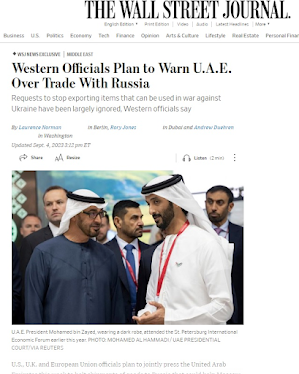BRICS membership expanded, and with that expansion comes benefits and responsibilities. Among them is closer economic cooperation among member states. This would mean that Russia, the hardest hit country by Western sanctions, and Iran, the second longest hit country by Western sanctions will be able to trade without fear of Western limits. Tow of the Arab nations that joined BRICS recently, Saudi Arabia and UAE, will feel the heat from their Western allies. It already started.
Officials from the US, UK, and EU are planning to “jointly press” the UAE into halting shipments of goods to Russia that "could help Moscow in its war against Ukraine,' according to western officials who spoke with the Wall Street Journal (WSJ).
Several US and European officials started a trip to the Gulf monarchy on 4 September “as part of a collective global push to keep computer chips, electronic components, and other so-called dual-use products” away from Russia.
Western envoys also traveled “jointly and separately” to countries such as Turkiye and Kazakhstan to pressure authorities into preventing western dual-use products from reaching Russia.
Despite ongoing pressure from the west, Abu Dhabi has not enforced sanctions imposed on Russia, instead deepening cooperation with the Kremlin. Nonetheless, the Gulf nation has condemned the invasion of Ukraine at the UN several times, and an Emirati official told the WSJ that the country enforces UN-imposed sanctions on Russia.
The official added the Gulf state is monitoring the export of dual-use products and is committed to protecting “the integrity of the global financial system.”
In response to the position taken by the UAE, US officials publicly labeled the UAE "a country of focus" earlier this year as they look to clamp down on Russia's ties with independent nations.
Dubai, in particular, has reaped the benefits of the Emirati government's neutrality, as Russian nationals have become the largest buying group of real estate in the luxurious Emirate, which has also become a hub for Russian oil traders.
The new pressure campaign from the west comes less than two weeks after the UAE was officially invited to join the Russian and Chinese-led BRICS+ group of nations. The expanded bloc also pledged to help Africa develop its local economy through investments by member states who have the cash and loans from the New Development Bank (BRICS bank). UAE, a country with cash that need to be invested, is taking advantage of this new opportunity.
The UAE pledged $4.5 billion in clean energy investments for the African continent on 5 September during the second day of the three-day African Climate Summit held in the Kenyan capital, Nairobi.
“We will deploy $4.5 billion … to jumpstart a pipeline of bankable clean energy projects in this very important continent,” Sultan Ahmed al-Jaber, the head of state-owned renewable energy firm Masdar and the Emirati national oil company ADNOC, told attendees on Tuesday.
“If Africa loses, we all lose,” warned Jaber, adding that the investment aims “to develop 15 GW (gigawatts) of clean power by 2030” and “catalyze at least an additional $12.5 billion from multilateral, public and private sources.”
Jaber, who is also president of the upcoming COP28 climate summit to be hosted by the UAE, said a consortium including Masdar would help achieve the clean power goals and stressed that a “surgical intervention of the global financial architecture that was built for a different era” is needed, urging institutions to lower debt burdens.
According to the International Renewable Energy Agency (IREA), Africa’s renewable generation capacity was 56 GW in 2022. Despite possessing an abundance of natural resources, just 3 percent of energy investments worldwide are made in Africa.
The three-day climate summit in Nairobi has attracted heads of state, government, and industry, including UN head Antonio Guterres, EU chief Ursula von der Leyen, and US climate envoy John Kerry.
“Renewable energy could be the African miracle, but we must make it happen,” Guterres told the summit on Monday. He also addressed the member states of the G20 to “assume your responsibilities” in the battle to combat climate catastrophe.
Kenyan President William Ruto said trillions of dollars in “green investment opportunities” would be needed as the climate crisis accelerates.
“Africa holds the key to accelerating decarbonization of the global economy. We are not just a continent rich in resources. We are a powerhouse of untapped potential, eager to engage and fairly compete in the global markets,” Ruto said.
Abu Dhabi sealed a deal with Egypt in June to build Africa's largest wind farm as the nation looks to rapidly expand the use of clean energy abroad and at home, where it operates three nuclear power reactors. The UAE also has three of the world's largest and lowest-cost solar plants.
This focus on clean energy is part of the UAE’s Net Zero by 2050 Strategic Initiative.
The development of renewable energy sources has recently become a priority for Gulf states, including Saudi Arabia, which plans to source 50 percent of its energy requirements from renewables by 2030.
Keeping our readers informed about the most consequential events in this fast changing world. Manage your Subscription; invite a friend to subscribe to ISR’s Weekly Review Bulletin



































No comments:
Write comments